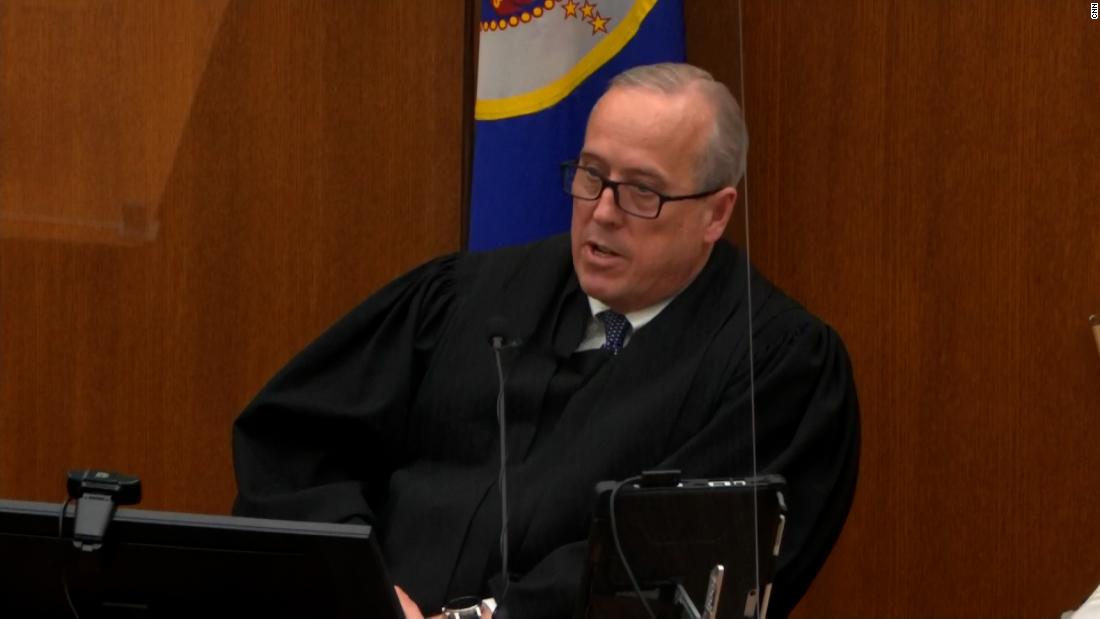
(CNN Español) – In a trial that has drawn worldwide attention in a case of police brutality and violence against the black community in the United States, Judge Peter Cahill is now in the spotlight as he will be the one to convict former police officer Derek Chauvin for death. from George Floyd.
Chauvin, the former Minneapolis cop, was found guilty of the murder of George Floyd. The verdict sparked waves of celebration in the United States after years of protests against police brutality.
Now that Chauvin has been found guilty, Judge Peter Cahill will determine his sentence according to state guidelines and consider a prosecution’s motion for a higher sentence for certain factors.
Here’s what we know about Judge Peter Cahill.

Juez Peter Cahill.
Who is Judge Peter Cahill
Peter Cahill is the judge in Derek Chauvin’s trial. He was appointed to the Fourth Judicial Circuit in 2007 and has been reelected three times. His current term ends in 2027, according to his profile on the Minnesota Judicial Branch website.
Cahill has over 30 years of attorney experience in Minnesota and has taught at the University of Minnesota School of Law, Mitchell Hamline School of Law and St. Thomas University School of Law, depending on his profile.
Cahill will decide on Chauvin’s verdict in June.
The case against Derek Chauvin
Cahill has achieved fame and “awards” for his work in the Chauvin trial, The New York Times reported. Those who know him have described him as a “courageous and decisive” judge, “warm and respectful,” as reported by NPR.
In the media case over George Floyd’s death, the Minnesota judge has instilled in jurors the need to separate their views on race and Chauvin from the evidence and evidence the prosecutors delivered in court. The judge was shocked when the City of Minneapolis announced a $ 27 million civil settlement with Floyd’s family before the trial. According to The New York Times, the agreement “raised fears that the jury would be affected” and also raised fears that it “might influence an appeal court’s ruling on the charges against Chauvin.”
Last Tuesday, Judge Cahill called on officials not to make “disrespectful” comments about the trial and their role as administrators of the justice system, especially because of its media nature.
“I would like elected officials to stop talking about this matter, especially in a way that is disrespectful to the rule of law, the judiciary and our role,” Cahill said. “I believe that if they want to express their opinion, they must do so in a respectful manner and in accordance with their oath to the constitution, to respect an equal branch of government.”
The judge had already ruled in a similar way andn June 2020, when the preliminary hearings of the case were held. Cahill called to the attorneys or related officers at trial not to publicly comment on the merits of the case, possible evidence, or guilt or innocence, even though it has not issued a formal silencing order.
The judge in the case has admonished both the prosecution and the defense to ensure that anyone they influence stops making inappropriate public comment.
Cahill also issued a stern warning, stating that any further inappropriate public statement about the case could result in a change of location to a location other than Minneapolis, although the trial was ultimately held in the city.
In “an unprecedented event,” according to NPR, Cahill also allowed cameras to enter the court to broadcast the entire trial, as space in court was very limited due to the Covid-19 pandemic.
“The only way to justify the defendant’s constitutional right to a public trial and the constitutional rights of the media and the public to access criminal proceedings is to allow audio and video reporting of the trial,” the judge said.
And his decisions in other cases have also given him great credibility as a judge. Like in 2015, when Cahill dismissed charges against organizers of a Black Lives Matter march, saying the protest was peaceful. And in 2019, he gave up nearly maximum punishment to a prominent skating coach for sexual abuse, The New York Times reported.
What’s the next step in the Chauvin process?
Judge Peter Cahill said on Tuesday that it will be another eight weeks before Derek Chauvin is sentenced. And although the ex-cop had been on bail since October, Cahill has reversed it after the verdict, so he is now awaiting sentence in prison.
Cahill said the court would investigate Derek Chauvin’s written arguments “within a week” and make factual findings on the matter. They will then order an investigation report prior to sentencing, which must be completed “within four weeks”. That will be followed by a briefing on the investigative report prior to the sentencing in six weeks and “in eight weeks we have a sentence”.
Now come the decisive months for Peter Cahill in a case in which Floyd’s family hopes justice will be served, as the judge’s decision “could be a big step forward in finding justice in the United States,” said President Joe Biden said Tuesday.
– With information from CNN’s Amir Vera, Caroline Kelly and Eric Levenson.